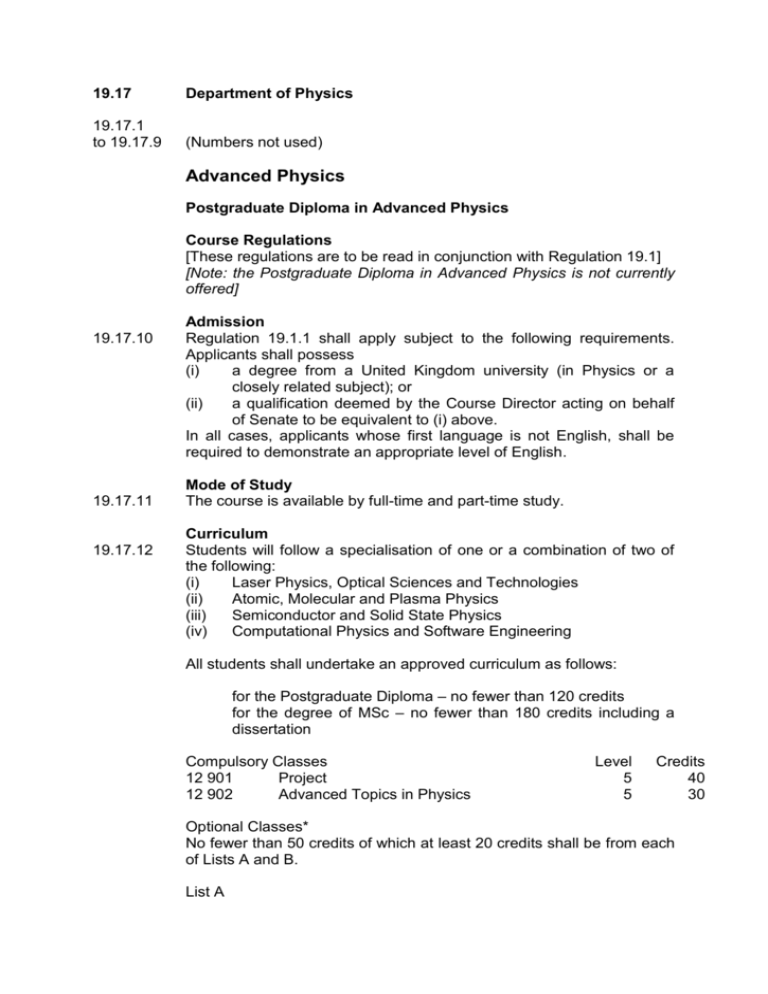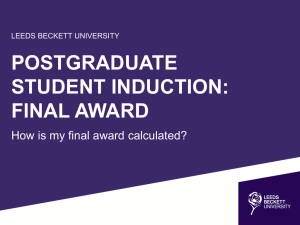Postgraduate Diploma in Quantum Information and Coherence
advertisement

19.17 Department of Physics 19.17.1 to 19.17.9 (Numbers not used) Advanced Physics Postgraduate Diploma in Advanced Physics Course Regulations [These regulations are to be read in conjunction with Regulation 19.1] [Note: the Postgraduate Diploma in Advanced Physics is not currently offered] 19.17.10 19.17.11 19.17.12 Admission Regulation 19.1.1 shall apply subject to the following requirements. Applicants shall possess (i) a degree from a United Kingdom university (in Physics or a closely related subject); or (ii) a qualification deemed by the Course Director acting on behalf of Senate to be equivalent to (i) above. In all cases, applicants whose first language is not English, shall be required to demonstrate an appropriate level of English. Mode of Study The course is available by full-time and part-time study. Curriculum Students will follow a specialisation of one or a combination of two of the following: (i) Laser Physics, Optical Sciences and Technologies (ii) Atomic, Molecular and Plasma Physics (iii) Semiconductor and Solid State Physics (iv) Computational Physics and Software Engineering All students shall undertake an approved curriculum as follows: for the Postgraduate Diploma – no fewer than 120 credits for the degree of MSc – no fewer than 180 credits including a dissertation Compulsory Classes 12 901 Project 12 902 Advanced Topics in Physics Level 5 5 Credits 40 30 Optional Classes* No fewer than 50 credits of which at least 20 credits shall be from each of Lists A and B. List A 12 903 12 904 12 905 List B 12 906 12 907 12 908 Z1 903 * 19.17.13 19.17.14 19.17.15 19.17.16 Research Assessment Skills Research Skills 1 Research Skills 2 5 5 5 10 10 10 Physics in Society Communicating Physics Managing Technological Innovation Commercialisation of Technology (Entrepreunership) 5 5 5 10 10 10 5 10 Additional classes may be selected, or required by the Adviser of Studies, to complete the student’s curriculum. These classes will be taken from an approved list. Examination, Progress and Final Assessment Regulations 19.1.25 – 19.1.33 shall apply. The final assessment will be based on performance in the examinations, coursework, the project and, if required, in an oral examination. Award Postgraduate Diploma: In order to qualify for the award of the Postgraduate Diploma in Advanced Physics, a candidate must normally have accumulated no fewer than 120 credits, of which 40 must have been awarded in respect of the project. Transfer A candidate for the Postgraduate Diploma who has performed at the level specified for the degree of MRes in Physics may be considered for transfer to the MRes subject to the approval of the Board of Study, acting on behalf of Senate, and on the recommendation of the Board of Examiners. 19.17.17 to 19.17.30 (Numbers not used) High Power RF Science and Engineering MSc in High Power RF Science and Engineering Postgraduate Diploma in High Power RF Science and Engineering Postgraduate Certificate in High Power RF Science and Engineering Course Regulations [These regulations are to be read in conjunction with Regulation 19.1] 19.17.31 Admission Notwithstanding Regulation 19.1.1, applicants shall possess either (i) a degree (or, in the case of direct entry to the degree of MSc, a first or second class Honours degree) from a United Kingdom University (in an appropriate discipline); or (ii) a qualification deemed by the Course Director (or nominees) acting on behalf of Senate to be equivalent to (i) above. This may include a requirement for appropriate industrial experience. Applicants may be required to submit to an interview. In all cases, applicants whose first language is not English, shall be required to demonstrate an appropriate level of English. 19.17.32 Place of Study Some individual research projects may require off-campus work. 19.17.33 Mode of Study The courses are available by full-time and part-time study. 19.17.34 Curriculum All students shall undertake an approved curriculum as follows: for the Postgraduate Certificate – no fewer than 60 credits for the Postgraduate Diploma – no fewer than 120 credits for the degree of MSc – no fewer than 180 credits including a dissertation Classes* Level Credits PH 901 Advanced Electromagnetics 5 15 PH 902 HPRF Physical Processes 5 15 PH 903 HPRF Passive Components 5 15 PH 904 HPRF Active Components 5 15 PH 905 Power Supplies and High Power RF Issues 5 15 PH 906 High Power RF Systems 5 15 * Subject to the approval of the Course Director, students may substitute a maximum of two classes with other postgraduate classes. Students for the Postgraduate Diploma only: either PH 908 High Power RF Short Project or PH 907 High Power RF Project Students for the degree of MSc only: PH 907 High Power RF Project 19.17.35 19.17.36 5 30 5 90 5 90 Examination, Progress and Final Assessment Regulations 19.1.25 – 19.1.33 shall apply. The final assessment will be based on performance in the examinations, coursework, the project and, if required, in an oral examination. 19.17.37 19.17.38 19.17.39 Award Degree of MSc: In order to qualify for the award of the degree of MSc in High Power RF Science and Engineering, a candidate must normally have accumulated no fewer than 180 credits of which 90 must have been awarded in respect of the project PH 907. Postgraduate Diploma: In order to qualify for the award of the Postgraduate Diploma in High Power RF Science and Engineering, a candidate must normally have accumulated no fewer than 120 credits from the classes of the course of which at least 30 must have been awarded in respect of the project, PH 908 or PH 907. Postgraduate Certificate: In order to qualify for the award of the Postgraduate Certificate in High Power RF Science and Engineering, a candidate must normally have accumulated no fewer than 60 credits from the taught classes of the course. 19.17.20 To 19.17.40 (Number not used) Nanoscience MSc in Nanoscience Postgraduate Diploma in Nanoscience Postgraduate Certificate in Nanoscience Course Regulations [These regulations are to be read in conjunction with Regulation 19.1] 19.17.41 Admission Notwithstanding Regulation 19.1.1, applicants shall possess either (i) a degree (or, in the case of direct entry to the degree of MSc, a first or second class Honours degree) from a United Kingdom University (in an appropriate discipline); or (ii) a qualification deemed by the Course Director (or nominees) acting on behalf of Senate to be equivalent to (i) above. This may include a requirement for appropriate industrial experience. Applicants may be required to attend an interview. 19.17.42 Place of Study Some individual research projects may require off-campus work. 19.17.43 Mode of Study The courses are available by full-time and part-time study. 19.17.44 Curriculum All students shall undertake an approved curriculum as follows: for the Postgraduate Certificate – no fewer than 60 credits for the Postgraduate Diploma – no fewer than 120 credits for the degree of MSc – no fewer than 180 credits including a project Compulsory Classes* Level Credits PH 950 Research Skills 5 20 PH 953 Introductory Nanoscience 5 20 PH 955 Advanced Nanoscience 1 5 20 PH 956 Advanced Nanoscience 2 5 20 CH 907 Advanced Nanoscience 3 5 20 either PH 954 Physics Conversion Course 5 20 or CH 906 Chemistry Conversion Course 5 20 * Subject to the approval of the Course Director, students may substitute a maximum of two Level 5 classes with other Level 5 classes. Students for the degree of MSc only: PH 952 Project 19.17.45 19.17.46 19.17.47 19.17.48 19.17.49 19.17.50 5 Examination, Progress and Final Assessment Regulations 19.1.25 – 19.1.33 shall apply. The final assessment will be based on performance in the examinations, coursework, the project and, if required, in an oral examination. Award Degree of MSc: In order to qualify for the award of the degree of MSc in Nanoscience, a candidate must normally have accumulated no fewer than 180 credits of which 60 must have been awarded in respect of the project. Postgraduate Diploma: In order to qualify for the award of the Postgraduate Diploma in Nanoscience, a candidate must normally have accumulated no fewer than 120 credits from the classes of the course. Postgraduate Certificate: In order to qualify for the award of the Postgraduate Certificate in Nanoscience, a candidate must normally have accumulated no fewer than 60 credits from the taught classes of the course. (Number not used) Optical Technologies MSc in Optical Technologies Postgraduate Diploma in Optical Technologies Postgraduate Certificate in Optical Technologies Course Regulations [These regulations are to be read in conjunction with Regulation 19.1] Admission 60 19.17.51 Notwithstanding Regulation 19.1.1, applicants shall possess either (i) a degree (or, in the case of direct entry to the degree of MSc, a first or second class Honours degree) from a United Kingdom University (in an appropriate discipline); or (ii) a qualification deemed by the Course Director (or nominees) acting on behalf of Senate to be equivalent to (i) above. This may include a requirement for appropriate industrial experience. Applicants may be required to attend an interview. 19.17.52 Place of Study Some individual research projects may require off-campus work. 19.17.53 Mode of Study The courses are available by full-time and part-time study. 19.17.54 Curriculum All students shall undertake an approved curriculum as follows: for the Postgraduate Certificate – no fewer than 60 credits for the Postgraduate Diploma – no fewer than 120 credits for the degree of MSc – no fewer than 180 credits including a project Compulsory Classes PH 950 Research Skills PH 951 Project Training Level 5 5 Credits 20 20 Optional Classes No fewer than 80 credits chosen from: PH 953 Introductory Nanoscience 5 PH 954 Advanced Nanoscience 1 5 PH 957 Topics in Photonics 5 PH 958 Optical Design 5 PH 959 Experimental Quantum and Atom Optics 5 PH 960 Advanced Topics in Photonics 5 PH 961 Device Microfabrication-Principle and Practice 5 PH 962 Photonic materials and devices 5 PH 963 Advanced Photonic Devices and Applications 5 EE 9XA Optical Communication 5 Such other Level 5 classes as may be approved by the Adviser of Study. Students for the degree of MSc only: PH 952 Project 19.17.55 19.17.56 5 Examination, Progress and Final Assessment Regulations 19.1.25 – 19.1.33 shall apply.. The final assessment will be based on performance in the examinations, coursework, the project and, if required, in an oral examination. 20 20 20 20 20 20 20 20 20 20 60 19.17.57 19.17.58 19.17.59 19.17.60 Award Degree of MSc: In order to qualify for the award of the degree of MSc in Optical Technologies, a candidate must normally have accumulated no fewer than 180 credits of which 60 must have been awarded in respect of the project. Postgraduate Diploma: In order to qualify for the award of the Postgraduate Diploma in Optical Technologies, a candidate must normally have accumulated no fewer than 120 credits from the classes of the course. Postgraduate Certificate: In order to qualify for the award of the Postgraduate Certificate in Optical Technologies, a candidate must normally have accumulated no fewer than 60 credits from the taught classes of the course. (Number not used) Photonics and Device Microfabrication MSc in Photonics and Device Microfabrication Postgraduate Diploma in Photonics and Device Microfabrication Postgraduate Certificate in Photonics and Device Microfabrication Course Regulations [These regulations are to be read in conjunction with Regulation 19.1] 19.17.61 Admission Notwithstanding Regulation 19.1.1, applicants shall possess either (i) a degree (or, in the case of direct entry to the degree of MSc, a first or second class Honours degree) from a United Kingdom University (in an appropriate discipline); or (ii) a qualification deemed by the Course Director (or nominees) acting on behalf of Senate to be equivalent to (i) above. This may include a requirement for appropriate industrial experience. Applicants may be required to attend an interview. 19.17.62 Place of Study Some individual research projects may require off-campus work. 19.17.63 Mode of Study The courses are available by full-time and part-time study. 19.17.64 Curriculum All students shall undertake an approved curriculum as follows: for the Postgraduate Certificate – no fewer than 60 credits for the Postgraduate Diploma – no fewer than 120 credits for the degree of MSc – no fewer than 180 credits including a project Compulsory Classes* Level Credits PH 950 Research Skills 5 20 PH 951 Project Training 5 20 PH 957 Topics in Photonics 5 20 PH 961 Device Microfabrication-Principle and Practice 5 20 PH 962 Photonic Materials and Devices 5 20 PH 963 Advanced Photonic Devices and Applications 5 20 *Subject to the approval of the Course Director, students may substitute a maximum of two Level 5 classes with other Level 5 classes. Students for the degree of MSc only: PH 952 Project 19.17.65 Examination, Progress and Final Assessment Regulations 19.1.25 – 19.1.33 shall apply. 5 60 19.17.66 19.17.67 19.17.68 19.17.69 19.17.70 The final assessment will be based on performance in the examinations, coursework, the project and, if required, in an oral examination. Award Degree of MSc: In order to qualify for the award of the degree of MSc in Photonics and Device Microfabrication, a candidate must normally have accumulated no fewer than 180 credits of which 60 must have been awarded in respect of the project. Postgraduate Diploma: In order to qualify for the award of the Postgraduate Diploma in Photonics and Device Microfabrication, a candidate must normally have accumulated no fewer than 120 credits from the classes of the course. Postgraduate Certificate: In order to qualify for the award of the Postgraduate Certificate in Photonics and Device Microfabrication, a candidate must normally have accumulated no fewer than 60 credits from the taught classes of the course (Number not used) Quantum Information and Coherence MSc in Quantum Information and Coherence Postgraduate Diploma in Quantum Information and Coherence Postgraduate Certificate in Quantum Information and Coherence Course Regulations [These regulations are to be read in conjunction with Regulation 19.1] 19.17.71 19.17.72 Admission Notwithstanding Regulation 19.1.1, applicants shall possess either (i) a degree (or, in the case of direct entry to the degree of MSc, a first or second class Honours degree) from a United Kingdom University (in an appropriate discipline); or (ii) a qualification deemed by the Course Director (or nominees) acting on behalf of Senate to be equivalent to (i) above. This may include a requirement for appropriate industrial experience. Applicants may be required to attend an interview. Place of Study Some individual research projects may require off-campus work. Mode of Study 19.17.73 The courses are available by full-time and part-time study. 19.17.74 Curriculum All students shall undertake an approved curriculum as follows: for the Postgraduate Certificate – no fewer than 60 credits for the Postgraduate Diploma – no fewer than 120 credits for the degree of MSc – no fewer than 180 credits including a project Compulsory Classes* PH 950 Research Skills PH 951 Project Training PH 959 Experimental Quantum and Atom Optics PH 964 Theoretical Quantum Information PH 965 Quantum Optics, Nonlinearity and Open Quantum Systems Level 5 5 5 5 Credits 20 20 20 20 5 20 5 5 5 5 5 20 20 20 20 20 Optional Classes No fewer than 20 credits chosen from PH 953 Introductory Nanoscience PH 954 Advanced Nanoscience 1 PH 957 Topics in Photonics PH 958 Optical Design PH 960 Advanced Topics in Photonics Such other classes Level 5 as may be approved by the Course Director. *Subject to the approval of the Course Director, students may substitute a maximum of two Level 5 classes with other Level 5 classes. For MSc Candidates only PH 952 Project 19.17.75 19.17.76 19.17.77 19.17.78 5 Examination, Progress and Final Assessment Regulations 19.1.25 – 19.1.33 shall apply. The final assessment will be based on performance in the examinations, coursework, the project and, if required, in an oral examination. Award Degree of MSc: In order to qualify for the award of the degree of MSc in Quantum Information and Coherence, a candidate must normally have accumulated no fewer than 180 credits of which 60 must have been awarded in respect of the project. Postgraduate Diploma: In order to qualify for the award of the Postgraduate Diploma in Quantum Information and Coherence, a candidate must normally have accumulated no fewer than 120 credits from the classes of the course. 60 19.17.79 Postgraduate Certificate: In order to qualify for the award of the Postgraduate Certificate in Quantum Information and Coherence, a candidate must normally have accumulated no fewer than 60 credits from the taught classes of the course. 20.17 Department of Physics Physics MRes in Physics Course Regulations [These regulations are to be read in conjunction with Regulations 20 and 20.4] 20.17.1 Admission Regulation 20.4.1 shall apply subject to the following requirements. Applicants shall possess (i) a first or second class Honours degree from a United Kingdom university (in Physics or a closely related subject ); or (ii) a qualification deemed by the Head of Department acting on behalf of Senate to be equivalent to (i) above. In all cases, applicants whose first language is not English, shall be required to demonstrate an appropriate level of English. 20.17.2 Duration of Study Regulations 20.4.5 and 20.4.6 shall apply. 20.17.3 Mode of Study The course is available by full-time and part-time study. 20.17.4 Curriculum Students will follow a specialisation of one or a combination of two of the following: (i) Laser Physics, Optical Sciences and Technologies (ii) Atomic, Molecular and Plasma Physics (iii) Semiconductor and Solid State Physics (iv) Computational Physics and Software Engineering All students shall undertake a curriculum based on the accumulation of no fewer than 180 credits, to be derived from the following compulsory and optional classes. Compulsory Classes 12 901 Project 12 902 Advanced Topics in Physics Level 5 5 Credits 80 40 Optional Classes* All students shall undertake classes amounting to no fewer than 60 credits of which at least 20 credits shall be from each of Lists A and B. List A 12 903 12 904 12 905 List B 12 906 12 907 12 908 Z1 903 Research Assessment Skills Research Skills 1 Research Skills 2 5 5 5 10 10 10 Physics in Society Communicating Physics Managing Technological Innovation Commercialisation of Technology (Entrepreunership) 5 5 5 10 10 10 5 10 * Additional classes may be selected, or required by the Adviser of Studies, to complete the student’s curriculum. These classes will be taken from an approved list. 20.17.5 20.17.6 20.17.7 20.17.8 20.18 to 20.21 Examination, Progress and Final Assessment Candidates are required to pass written examinations and to perform to the satisfaction of the Board of Examiners in the course work and in the Project. The final assessment will be based on performance in the examinations, coursework, the Project and, if required, in an oral examination. Award Degree of MRes in Physics and Degree of MRes in Physics (in specific research area): In order to qualify for the degree of MRes in Physics or degree of MRes in Physics (in specified research area), a candidate must have performed to the satisfaction of the Board of Examiners and must normally have accumulated no fewer than 180 credits, of which 80 must have been awarded in respect of the Project. Transfer A candidate for the degree of MRes who fails to meet the requirements for the award of the degree, but who has satisfied the requirements for the award of the Postgraduate Diploma in Advanced Physics may be considered for the award of the Postgraduate Diploma and have his or her registration so transferred subject to the approval of the Board of Study, acting on behalf of Senate, and in accordance with the recommendation of the Board of Examiners. (Numbers not used)






